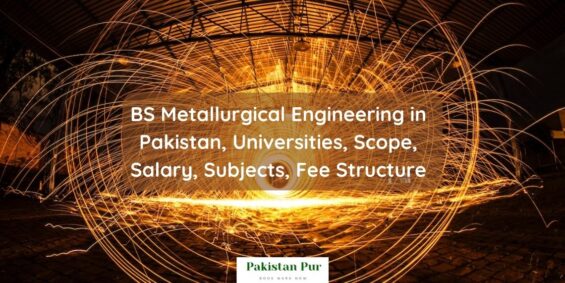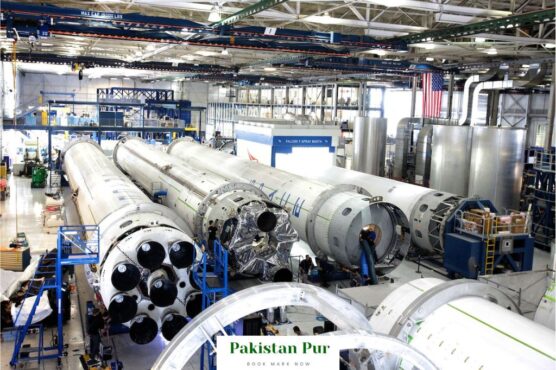
Table of Contents
Metallurgical Engineering is a branch of engineering that focuses on the study of metals and their properties, including extraction, processing, and utilization, to develop innovative materials and processes for various industries.
Pursuing a BS Metallurgical Engineering in Pakistan can be a great choice. From studying the properties of metals to exploring extraction techniques and manufacturing processes, this program covers it all.
BS Metallurgical Engineering graduates can expect rewarding careers and competitive salaries a promising scope in industries like manufacturing, mining, and research. Embrace the opportunity to shape the future with metallurgical engineering in Pakistan.
This Guide to Metallurgical Engineering in Pakistan is a part of the series on the best fiels after FSc Pre Engineering. Read the full list of best degrees after FSc Pre Engineering.
Best Fields after FSc Pre Engineering in Pakistan

BS Metallurgical Engineering Universities in Pakistan
These universities offer BS Metallurgical Engineering in Pakistan. Use the search function to find a university in your city.
| Institution | City | Program | Public/Private |
|---|---|---|---|
| National University Of Science & Technology | Islamabad | BE , 4 Years | Public |
| Pakistan Institute Of Engineering & Applied Sciences | Islamabad | BS , 4 Years | Public |
| Mehran University Of Engineering & Technology | Jamshoro | BE , 4 Years | Public |
| Dawood University Of Engineering And Technology | Karachi | BE , 4 Years | Public |
| NED University Of Engineering & Technology | Karachi | BE , 4 Years | Public |
| University Of Engineering & Technology, Lahore | Lahore | B.Sc., 4 Years | Public |
| University Of The Punjab | Lahore | B.Sc, 4 Years | Public |
| Bahauddin Zakariya University, Multan | Multan | B.Sc. , 4 Years | Public |
| University of Engineering & Technology, Taxila | Taxila | B.Sc., 4 Years | Public |
Metallurgical Engineering vs Material Engineering
| Metallurgical Engineering | Material Engineering |
| Focuses on metals, including extraction, refining, and processing. | Encompasses metals, polymers, ceramics, and composites. |
| Emphasizes metal manufacturing and utilization in industries like iron and steel. | Explores material behavior and develops new materials for various applications. |
| Involves research on metallurgical processes, quality control, and failure analysis. | Studies material properties, testing methods, and material selection techniques. |
| Offers career opportunities in manufacturing, mining, R&D, and consulting. | Provides prospects in manufacturing, construction, electronics, energy, and nanotechnology. |
| Requires understanding of metallurgical principles, chemistry, physics, and engineering concepts. | Demands knowledge in material science, chemistry, physics, mechanics, and engineering principles. |
Metallurgical Engineering focuses on metals, their extraction, refining, and industrial applications such as iron and steel.
Material Engineering explores a wider range of materials, including metals, polymers, ceramics, and composites, to develop new materials for diverse sectors.
Metallurgical Engineering involves research on metallurgical processes and quality control, while Material Engineering focuses on studying material properties and selecting suitable materials. Both fields offer career opportunities in various industries.
Metallurgical Engineering requires knowledge of metallurgical principles, chemistry, physics, and engineering concepts, while Material Engineering demands proficiency in material science, chemistry, physics, mechanics, and engineering principles.
To understand the scope of metallurgical engineering in Pakistna, read our guide below.
Scope Of Metallurgical Engineering In Pakistan

BS Metallurgical Engineering Subjects and Syllabus
Here is a list of subjects typically covered in a BS Metallurgical Engineering program:
- Engineering Mathematics
- Thermodynamics and Rate Processes
- Materials Science and Engineering
- Physical Metallurgy
- Extractive Metallurgy
- Mechanical Behavior of Materials
- Metallurgical Laboratory Techniques
- Engineering Economics and Management
- Industrial Training/Internship
Please note that this is a general overview, and the specific subjects and syllabus may vary between universities. It is recommended to refer to the official websites of the universities offering Metallurgical Engineering programs for more detailed and up-to-date information.
HEC and PEC Syllabus for BS Metallurgical Engineering
PEC and HEC developed syllabus for BS Metallurgical engineering for Pakistani universities. The syllabus lets the universities teach some optional subjects but they largely follow the HEC syllabus for BS Metallurgical engineering.
You can read the full BS Metallurgical Engineering Syllabus by HEC here.
Year 1: Semester 1
- Communication Skills
- Applied Physics
- Calculus
- Introduction to Computing
- Applied Chemistry
- Islamic Studies/Ethics
- Semester Lab-I
Year 1: Semester 2
- Engineering Drawing and CAD
- Workshop Practice
- Introduction to Engineering Materials
- Engineering Mechanics
- Pakistan Studies
- Differential Equations
- Options Course Based on PEOs
- Semester Lab-2
Year 2: Semester 3
- Inspection and Testing of Materials
- Mineral Processing
- Numerical Analysis and Computer Programming
- Materials Thermodynamics
- Physical Metallurgy-I
- Social Psychology
- Semester Lab-3
Year 2: Semester 4
- Mechanical Behaviour of Materials
- Technical Report Writing and Presentation Skills
- Pysical Metallurgy-II
- Iron and Steel Making
- Nongerrous Metallurgy
- Community Service
- Industrial Safety and Environmental Engineeting
- Semester Lab-4
Year 3: Semester 5
- Polymeric Materials
- Heat Treatment
- Instrumentation & Controls (Interdisciplinary)
- Engineering Ceramics and Glasses
- Probablity and Statistics
- Engineering Economics (Social Science I)
- Semester Lab -5
Year 3: Semester 6
- Manufacturing Processes
- Management Sciences Elective-I
- Foundary Engineering
- Joining of Materials
- Corrosion Engineering
- Semester Lab-6
Year 4: Semester 7
- Composite Materials
- Research Methodology
- Enterpreneurship and Marketing
- Computational Materials Science
- MBCD Elective
- Senior Design Project Part-I
- Semester Lab-7
Year 4: Semester 8
- MBCD Elective
- Management Science Elective II
- Advanced Materials and Nanotechnology
- Design and Selection of Materials
- Senior Design Project II
BS Metallurgical Engineering in Pakistan Eligibility Criteria
These are the basic admission eligibility requirements for UET. Since UET conducts admission tests for engineering programs, this eligibiltity criteria can work as a yard stick for other institutions. However, I suggest that you check the admission criteria for your university of choice before you proceed.
- At least 60% marks in F.Sc/ ICS/ DAE/ B.Sc/ B.Tech(Pass) Examination excluding Sports and Hafiz-e-Quran marks.
- Appeared in the entry test arranged by this University for that particular Acedmic Session in which he seeks admission.
- Atleast 60% adjusted admission marks determined as per clause 2 of the merit determination criteria.
- bonafide resident of the area from where he seeks admission
- Meet standards of physique and eye sight laid down in the medical certificate. (Form II)
BS Metallurgical Engineering Fee Structure
| Institution | Admission Fee | Total 1st Semester Fee | 2nd and Subsequent Semester Fees | Total Degree Fee |
| National University Of Science & Technology, Islamabad | Rs. 30,000 | Rs. 196,740 | Rs. 151,740 | Rs. 12,58,920 |
| Mehran University Of Engineering & Technology, Jamshoro | Rs. 20,000 | Rs. 69,050 | Rs. 36,400 | Rs. 323,850 |
| Dawood University Of Engineering And Technology, Karachi | Rs. 10,000 | Rs. 87,000 | Rs. 77,000 (approx) | Rs. 626,000 (approx) |
| NED University Of Engineering & Technology, Karachi | Rs. 43,000 | Rs. 73,900 | Rs. 37,000 | Rs. 332,900 |
| University Of Engineering & Technology, Lahore | Rs. 49,760 | Rs. 97,337 | Changes w/credit hours | Rs. 620,156 |
BS Metallurgical Engineering in Lahore
These universities offer BS Metallurgical Engineering in Lahore.
- University Of Engineering & Technology, Lahore
- University Of The Punjab
BS Metallurgical Engineering in Karachi
These universities offer BS Metallurgical Engineering in Karachi.
- Dawood University Of Engineering And Technology
- NED University Of Engineering & Technology
BS Metallurgical Engineering in Islamabad
These universities offer BS Metallurgical Engineering in Islamabad.
- National University Of Science & Technology
- Pakistan Institute Of Engineering & Applied Sciences
Leave a Reply